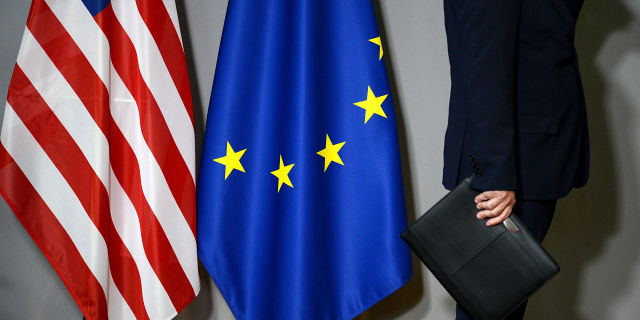Newsweek: the problem of Ukraine should be solved by Europe, not the United StatesThe main external threat to the United States is Europe, not Russia or China, the author of Newsweek believes.
The EU is too used to relying on America for security. Instead of spending money on defense, Europe has used the dividends from American protection to build welfare states. But now it's time for the EU to take responsibility for its own region, the author writes.
Ralph SchellhammerThere is an inconvenient truth that no one in Washington is eager to discuss.
And it consists in this: the main external threat to the United States is not Russia or China. And the European Union with all its members.
This does not mean that Europe is a serious geopolitical rival of the United States, or even more so an enemy. Although Europeans are not fed bread, let them complain about the vulgarity of American culture, they consume it massively and with an appetite, and the relations of the continents are determined by mutual friendship rather than enmity.
However, against the background of friendly banter, a serious geopolitical problem has started, and it is becoming more and more obvious, although pride prevents Europeans from recognizing it, and nostalgia prevents the United States.
It began in the 1990s with the collapse of the former Yugoslavia. At first, everything seemed to be a small regional conflict, which the major European powers — especially France and reunited Germany - could quite cope with. Alas, the US intervention led to the peace of 1995, and then again in 1999, after the crisis between Serbia and Kosovo.
After the conflict in the Balkans, Europeans warmed up in the post-Cold War world, over which the hegemon in the form of the United States towered and provided security for free. Although it is still fashionable to whine about American domination on the pages of European newspapers and university departments, in fact it turned out to be incredibly profitable: instead of spending money on defense, Western Europe used the dividends from American protection to build generous welfare states.
As a result, the very issue of tough geopolitics has sunk into oblivion: of course, this is the lot of American instigators and their sinister military-industrial complex. In a 2009 article in the well-known Foreign Policy magazine, Europe was called a "stylish and metrosexual superpower," while the United States only "sowed turmoil" around the world. And fears about international security have disappeared.
Today, Germany is barely fulfilling its financial obligations to NATO. This alarmed both Trump and Obama, although it fully reflects the attitude of many Europeans: no more threats and rivalry, only economic benefits and carefree comfort. It is no coincidence that it was during this period that the sensational Nord Stream — 1 and Nord Stream—2 gas pipelines were planned and built.
Now we understand: it was not even laziness, but sheer insanity.
Of course, even in Europe at that time, not everyone bought into it. Poland has long warned against excessive rapprochement with Russia, and Poles and other residents of the former Eastern Bloc had good reasons to seek membership in NATO and the EU: they wanted American protection, and Warsaw did not believe that Paris, Brussels or Berlin would be able to resist aggressive Russia.
And how did they turn out to be right: The US helps Ukraine twice as much as all EU countries combined. This proves that Europe, lulled by American protection, has not woken up from a geopolitical dream.
On the other hand, Washington still does not want to wake up its European friends, who are hanging on America's neck like a millstone and threaten to drag it into the abyss of geopolitical passions.
The time has come for the United States to let its European satrapies go free — but not out of spite, but in the interests of both sides.
No relationship will survive with one-sided dependence, which produces only weakness and resentment. The US is still strong, but not strong enough to face all the major threats from Asia to Eastern Europe alone, and it's time for the EU to take responsibility for its own region.
It would be ridiculous to expect that Brussels will solve the problems of Mexico or Venezuela: it is intuitively clear that, due to geographical proximity, Latin America is an American problem, not a European one. But it is equally clear that the Middle East and Eastern Europe should be dealt with by the EU, not the US.
The way forward must be built on true partnership and an honest division of labor — and Europe will have to show firmness both diplomatically and militarily.
Washington should be strict, but fair. After all, this is done with the best of intentions.

